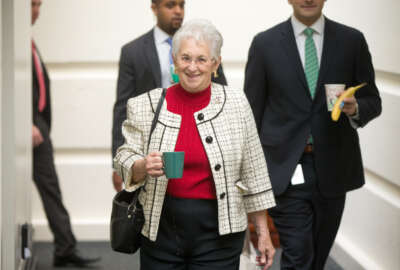
Grants managers see promise in the GREAT Act, but say it could be even ‘greater’
Sponsors of the Grants Reporting Efficiency and Agreements Transparency (GREAT) Act are waiting for a Congressional Budget Office score before bringing the bill to...
Members of the grants management community see an opportunity to take a new piece of legislation designed to improve the grants management process from good to “great.”
The Grant Reporting Efficiency and Agreements Transparency (GREAT) Act legislation would help agencies better track hundreds of billions of dollars a year in federal grants, in an effort to free up more time to measure and manage those programs and their performance, the bill’s co-sponsors, Reps. Virginia Foxx (R-N.C.) and Jimmy Gomez (D-Calif.) say.
The legislation tasks the Office of Management and Budget to create standard data elements for the information that federal grants recipients must report back to agencies.
The grants management community seems to be on board with the GREAT Act, but many say they see opportunities to take the legislation even further.
“It takes a lot of collaboration across agencies, and you’re dealing with people who have different backgrounds, different terms for what would appear to be the same thing,” one member of the grants management community said Thursday at a forum on the GREAT Act, hosted by REI Systems and George Washington University. “I would suggest in your thinking in this bill, you also have to think about those definitions. Because until you get consistency in definitions, then the technology is just taking what is an existing paper process and making it digital. That’s great, that’s helpful. Some of that automation comes in, but until you get consistent definitions, that’s where you’re reducing burden.”
Carson Middleton and Andrew Noh, legislative directors for Foxx and Gomez, both say cutting compliance costs and making data more transparent will make the grants process overall easier to understand for members of the public.
Both Foxx and Gomez latched onto the idea of the GREAT ACT after fielding many questions about the federal grants process from their constituents, the lawmakers’ legislative directors said.
Both Middleton and Noh acknowledged the legislation doesn’t completely prompt a true overhaul of the federal grants management process, but it does force agencies to make their data more open and transparent.
“With the grants that we have, let’s make sure we can shepherd those resources wisely and measure them,” Middleton said. “We don’t have to necessarily go through trying to expunge grants programs right now to save money, maybe we can do it through a more efficient process.”
For example, specifically changing a program’s definitions to perfectly align with every other grant program’s definitions would take a serious of amount of time and effort, since many are authorized in statute, Middleton said.
Some members of the grants management community said it was a challenge for their agencies to find and agree on common standards of their own, and they wondered whether all of government could truly buy into common reporting elements.
The point of the GREAT Act, the legislative directors said, is to give OMB broad discretion to develop common data standards and describe exceptions to those standards in certain circumstances.
“The macro goal is to put everything on the table and then if things need to be exempted or fall off the table, we’ll approach it when we get to it,” Middleton said.
According to the legislation, OMB and the agency that issues the majority of federal grants would develop common data standards within the first year of the bill’s passage. Agencies would receive guidance on how to apply those standards within the second year. Within four years, agencies would be expected to collect and publish recipients’ grants data on a single portal, preferably Grants.gov.
The GREAT Act also encourages the administration to use “existing or yet to be developed” technology to automate grants reporting.
A single portal of most grants information may help potential recipients search for the kind of program that would best suit their needs, but that search process would still be a laborious one, grants managers said.
Middleton said members in the Senate have expressed interest in a companion bill. The GREAT Act cleared the House Oversight and Government Reform Committee in February, but the sponsors are waiting for a Congressional Budget Office score before bringing the bill to the House floor.
Copyright © 2024 Federal News Network. All rights reserved. This website is not intended for users located within the European Economic Area.
Nicole Ogrysko is a reporter for Federal News Network focusing on the federal workforce and federal pay and benefits.
Follow @nogryskoWFED
Related Stories





